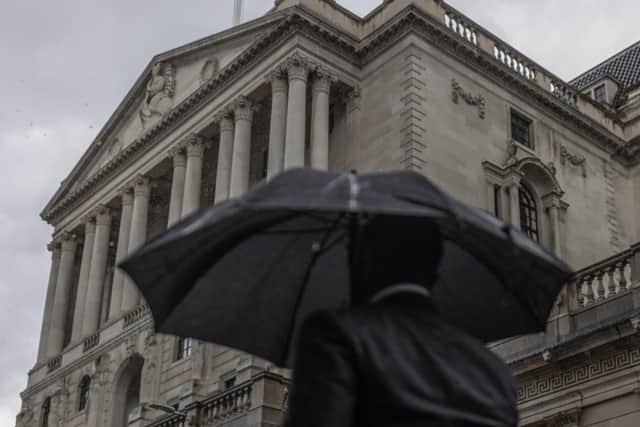Interest rates UK: How another hike will affect your mortgage, savings and pension annuity
Central bank officials have been weighing up a range of factors amid mixed signals over the strength of the economy and the pace at which inflationary pressures are receding. Recent disappointing readings from monthly purchasing managers’ reports covering the manufacturing and service sectors, sluggish retail sales and a sharper-than-expected decline in economic output during July will have strengthened the case to pause the rate hiking, and there remains an outside chance that may still happen, but most observers are anticipating a further quarter-point increase on Thursday, which would take the bank base rate to 5.5 per cent.
The latest rate decision may well mark the end of the current hiking cycle, and the 15th increase on the trot, but higher rates are likely to linger with many analysts not expecting a cut until at least the latter half of next year.
Advertisement
Hide AdAdvertisement
Hide AdThe most immediate, and potentially painful, impact from another jump in interest rates will be felt by holders of variable rate and tracker mortgages. Sarah Coles, head of personal finance at investment platform Hargreaves Lansdown, has taken a look at what a rate hike means for mortgages.


She said: “For anyone with a variable mortgage, this week’s rate rise is likely to make your monthly payments more expensive. Anyone who moved onto a variable deal when their fixed rate expired last autumn, in the hope that fixed rate deals would get cheaper, will have stomached a year of ever-increasing rates. However, for those coming to the end of a fixed-rate deal and looking to remortgage, the end of the rate rise cycle spells better news. The market has gradually accepted that we’re unlikely to get as many rate rises as it had feared, so rates have been gradually drifting south. Assuming no major shocks on the inflation front, this may well continue. It means yet again we could see the counter-intuitive mix of the Bank of England raising rates and the banks cutting theirs.”
She added: It's going to take something more significant for a step change in rates, so we don’t expect huge movements in the immediate future. It means mortgages will still remain far higher than we have seen in recent years, and as people are forced to remortgage, it will take lumps out of their financial resilience. For that to change, we’d need to see market expectations of cuts, and for that we’re likely to have to wait much longer.”
Earlier this year, economists had been warning that the base rate could push above 6 per cent though these forecasts have largely been trimmed back to between 5.5 and 5.75 per cent. While borrowers have faced fresh misery, the higher rates have been good news for millions of savers. A recent survey of more than 2,200 adults, carried out by Ipsos on behalf of the Money and Pensions Service (MaPS), revealed that two thirds of people have been putting money into savings in the past six months. Interest rates on savings products such as building society deposit accounts, fixed-rate bonds and ISAs have been steadily improving on the bank of the base rate increases but there has been criticism of how quickly those benefits are being passed on to savers.
Coles suggests that the good times could be coming to an end for those with some spare cash to tuck away. She said: “Assuming we’re coming to the end of the rate rise cycle, this could be as good as it gets for fixed-rate savings. Anyone who has been waiting for rates to peak before fixing may not want to wait much longer. The banks don’t just focus on the immediate future when setting fixed savings rates, they look at what’s likely to happen to interest rates during the entire fixed period. The fact that this may be the last of the hikes means there’s little incentive for them to put rates up further.


“In fact, the very best fixed rates over two and three years are down a little from their July levels – from 6.15 per cent to 6.05 per cent over two years and from 6.06 per cent to 6 per cent over three. The one-year market differs slightly, because the launch of the NS&I bond paying 6.2 per cent has encouraged more competition, and encouraged several players to push through the 6 per cent barrier.”
She added: “The easy access market, meanwhile, is slightly more sensitive to rate rises. It has been inching up ever since the Bank of England started raising rates. The average is now over 3 per cent and the very best at 5 per cent. These may have slightly further to go. However, if you’re hanging around in an account paying next to nothing, it’s not worth waiting. It pays to switch to the best account today – you can always switch again later if rates rise much further from here.”
Touching on the implications for annuities from higher rates, Helen Morrissey, head of retirement analysis at Hargreaves Lansdown, noted: “Annuity rates have soared over the past two years reaching heights not seen since before the global financial crisis. A 65 year old with a pension pot of £100,000 can currently get an income of up to £7,317 a year (single life, level, five year guarantee). This has been great news for retirees in need of a guaranteed income who had been disappointed by the poor rates on offer previously. If interest rates rise as forecast, it’s unlikely we would see any huge spike, with rates remaining on an even keel.”
Comments
Want to join the conversation? Please or to comment on this article.